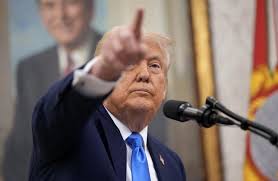A coalition of 12 U.S. states has filed a lawsuit on Wednesday, April 23, challenging the Trump administration’s controversial tariffs. The states argue that President Trump cannot impose such tariffs without the approval of Congress, asserting that his actions violate the constitutional order.
“This tariff scheme is not just economically reckless — it’s illegal,” said Arizona Attorney General Kris Mayes in a statement. Arizona, along with Democratic-led states like Minnesota, New York, and Oregon, is part of the legal filing. A similar lawsuit was filed by California the week before.
During his second term, President Trump has shaken up decades of free trade policies, particularly with his “Liberation Day” announcement of new tariffs on various countries. Among the most significant changes is a 145 percent tariff on Chinese imports, prompting a retaliatory 125 percent tariff from Beijing. Trump, however, reassured reporters on Wednesday that he is still working towards a “fair deal with China.”
Along with China, Trump has imposed a 10 percent tariff on other trade partners and has threatened further tariffs.
The lawsuit, filed by the coalition of states, challenges the legal basis for Trump’s tariffs. They argue that the 1977 law the president invoked does not grant him the power to unilaterally impose tariffs. Instead, they claim this power is constitutionally reserved for Congress. The lawsuit asserts that by imposing tariffs on goods entering the U.S. under the guise of an emergency, the president has disrupted the constitutional balance of power and destabilized the American economy.
Trump has defended his protectionist policies, claiming they will bring manufacturing jobs back to the U.S. However, Attorney General Mayes countered that tariffs are essentially a tax burden passed on to consumers. “No matter what the White House claims, tariffs are a tax that will be passed on to Arizona consumers,” she said.
Additionally, a report from The New York Times on Wednesday revealed that Trump’s approval rating has been steadily declining, reaching a low of 44 percent in his first three months in office.




